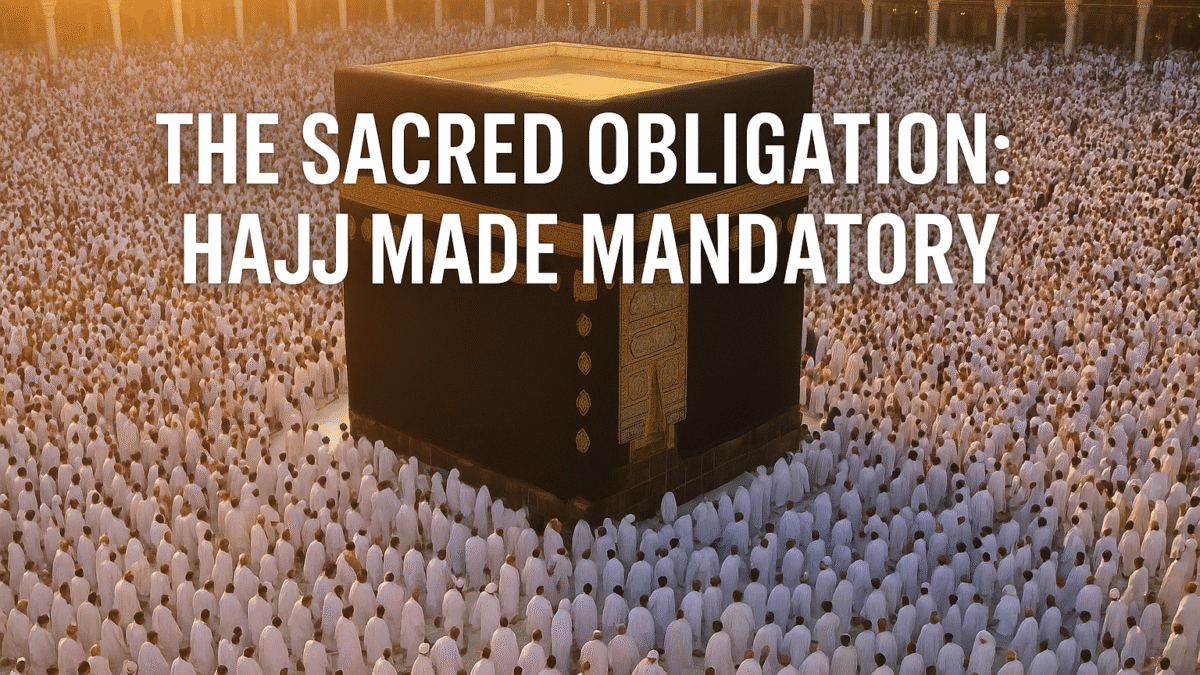The Sacred Obligation: Hajj Made Mandatory for Muslims on the 8th Dhu al-Qidah
Introduction
The 8th Dhu al-Qidah holds immense significance in the Islamic calendar. On this day, a pivotal event occurred that has since become one of the Five Pillars of Islam—the mandatory pilgrimage to Mecca, known as Hajj, was ordained for Muslims. In this blog post, we will delve into the historical context, the significance of Hajj, and its enduring importance in the lives of Muslims worldwide.
Historical Context
The 8th Dhu al-Qidah, a date marked by celestial alignments and divine revelations, signified a profound moment in Islamic history. The Messenger of Allah, Prophet Muhammad (peace be upon him), had already received the message of Islam and established a growing Muslim community. However, the commandment regarding Hajj came later in the Islamic timeline, during the Prophet’s farewell pilgrimage.
The Farewell Pilgrimage
In the 10th year of the Islamic calendar, the Prophet Muhammad embarked on his farewell pilgrimage, known as the Hajjat al-Wida. It was during this pilgrimage, on the 8th Dhu al-Qidah, that the divine revelation was received, making Hajj a mandatory religious duty for all capable Muslims.
The Significance of Hajj
- Spiritual Cleansing: Hajj is considered an essential journey of purification and spiritual rejuvenation. Pilgrims cleanse their souls through rituals, repentance, and prayers, seeking forgiveness for their sins.
- Unity of the Ummah: Hajj unifies Muslims from all corners of the globe, transcending linguistic, ethnic, and cultural boundaries. It emphasizes the concept of “Ummah” or the global Islamic community.
- Submission to Allah: By undertaking Hajj, Muslims demonstrate their complete submission to the will of Allah. They follow in the footsteps of Prophet Ibrahim (Abraham) and his family, reaffirming their devotion to the One God.
- Commemoration of Sacrifice: Hajj commemorates the trials and sacrifices made by Prophet Ibrahim and his family. It includes rituals such as the symbolic stoning of the devil, reenacting Ibrahim’s rejection of Satan’s temptations.
- Social Equality: During Hajj, all pilgrims wear simple white garments called ihram, which symbolize equality and humility. Regardless of social or economic status, all pilgrims stand as equals before Allah.
Enduring Importance
The obligation of Hajj serves as a continuous reminder of several enduring principles in Islam:
- Obedience to Allah: It reinforces the core principle of submission to Allah’s commands and the importance of following His guidance.
- Brotherhood and Unity: Hajj fosters a sense of brotherhood among Muslims, emphasizing the unity of the Muslim community.
- Repentance and Renewal: Pilgrims return from Hajj with a renewed sense of faith, having sought forgiveness and a fresh start in their spiritual journey.
- Compassion and Charity: Hajj encourages acts of charity and kindness, reminding Muslims of their responsibility towards those less fortunate.
Conclusion
The 8th Dhu al-Qidah stands as a pivotal moment in Islamic history when the divine commandment to perform Hajj was revealed. Hajj is not merely a religious obligation but a transformative journey that shapes the faith and character of Muslims. It reinforces the core values of Islam, including submission to Allah, unity among believers, and a commitment to righteousness and justice. Today, millions of Muslims worldwide continue to undertake the sacred pilgrimage, carrying forward the legacy of Prophet Ibrahim and the divine decree of the 8th Dhu al-Qidah.
عنوان: مقدس فریضہ: 8 ذی القعدہ کو مسلمانوں پر حج فرض کر دیا گیا
تعارف
آٹھویں ذی القعدہ کو اسلامی کیلنڈر میں بہت زیادہ اہمیت حاصل ہے۔ اس دن، ایک اہم واقعہ پیش آیا جو اس کے بعد سے اسلام کے پانچ ستونوں میں سے ایک بن گیا ہے- مکہ کی لازمی زیارت، جسے حج کہا جاتا ہے، مسلمانوں کے لیے مقرر کیا گیا تھا۔ اس بلاگ پوسٹ میں، ہم تاریخی تناظر، حج کی اہمیت، اور دنیا بھر کے مسلمانوں کی زندگیوں میں اس کی لازوال اہمیت کا جائزہ لیں گے۔
تاریخی سیاق و سباق
آٹھویں ذی القعدہ، ایک تاریخ جو آسمانی صف بندیوں اور الہامی وحی سے نشان زد ہے، اسلامی تاریخ میں ایک گہرے لمحے کی نشاندہی کرتی ہے۔ اللہ کے رسول، حضرت محمد صلی اللہ علیہ وسلم نے اسلام کا پیغام پہلے ہی حاصل کر لیا تھا اور ایک بڑھتی ہوئی مسلم کمیونٹی قائم کی تھی۔ تاہم، حج کے بارے میں حکم بعد میں اسلامی ٹائم لائن میں، نبی صلی اللہ علیہ وسلم کی الوداعی حج کے دوران آیا۔
الوداعی حج
اسلامی کیلنڈر کے 10ویں سال میں، پیغمبر اسلام نے اپنی الوداعی حج کا آغاز کیا، جسے حجۃ الوداع کہا جاتا ہے۔ اسی حج کے دوران، 8 ذی القعدہ کو، آسمانی وحی موصول ہوئی، جس نے تمام اہل مسلمانوں کے لیے حج کو ایک لازمی مذہبی فریضہ قرار دیا۔
حج کی اہمیت
روحانی صفائی: حج تزکیہ نفس اور روحانی تجدید کا ایک ضروری سفر سمجھا جاتا ہے۔ حجاج کرام اپنے گناہوں کی معافی مانگتے ہوئے عبادات، توبہ اور دعاؤں کے ذریعے اپنی روح کو پاک کرتے ہیں۔
اتحاد امت: حج لسانی، نسلی اور ثقافتی حدود سے بالاتر ہوکر دنیا کے کونے کونے سے مسلمانوں کو متحد کرتا ہے۔ اس میں “امت” یا عالمی اسلامی برادری کے تصور پر زور دیا گیا ہے۔
اللہ کے آگے سر تسلیم خم کرنا: حج کر کے مسلمان اللہ کی مرضی کے سامنے اپنی مکمل اطاعت کا مظاہرہ کرتے ہیں۔ وہ حضرت ابراہیم (ابراہیم) اور ان کے خاندان کے نقش قدم پر چلتے ہیں، ایک خدا سے اپنی عقیدت کا اعادہ کرتے ہیں۔
قربانی کی یاد: حج حضرت ابراہیم اور ان کے خاندان کی آزمائشوں اور قربانیوں کی یاد دلاتا ہے۔ اس میں شیطان کو علامتی سنگسار کرنے جیسی رسومات شامل ہیں، ابراہیم کی طرف سے شیطان کے فتنوں کو مسترد کرنے کا دوبارہ عمل کرنا۔
سماجی مساوات: حج کے دوران تمام عازمین سادہ سفید لباس پہنتے ہیں جسے احرام کہتے ہیں، جو مساوات اور عاجزی کی علامت ہے۔ سماجی یا معاشی حیثیت سے قطع نظر، تمام حجاج اللہ کے سامنے برابر کھڑے ہیں۔
پائیدار اہمیت
حج کی فرضیت اسلام میں کئی پائیدار اصولوں کی مسلسل یاد دہانی کے طور پر کام کرتی ہے:
اللہ کی اطاعت: یہ اللہ کے احکام کے سامنے سر تسلیم خم کرنے کے بنیادی اصول اور اس کی ہدایت پر عمل کرنے کی اہمیت کو تقویت دیتا ہے۔
اخوت اور اتحاد: حج مسلمانوں کے درمیان بھائی چارے کے جذبات کو فروغ دیتا ہے، مسلم کمیونٹی کے اتحاد پر زور دیتا ہے۔
توبہ اور تجدید: عازمین حج سے ایمان کی تجدید کے ساتھ واپس لوٹتے ہیں، اپنے روحانی سفر میں استغفار اور ایک نئے آغاز کے ساتھ۔
ہمدردی اور خیرات: حج خیرات اور احسان کے کاموں کی حوصلہ افزائی کرتا ہے، مسلمانوں کو ان کی ذمہ داری کی یاد دلاتا ہے جو کم نصیبوں کے لیے ہیں۔
نتیجہ
آٹھویں ذی القعدہ اسلامی تاریخ کا ایک اہم لمحہ ہے جب حج کرنے کا حکم الٰہی نازل ہوا۔ حج محض ایک مذہبی فریضہ نہیں ہے بلکہ ایک تبدیلی کا سفر ہے جو مسلمانوں کے ایمان اور کردار کی تشکیل کرتا ہے۔ یہ اسلام کی بنیادی اقدار کو تقویت دیتا ہے، بشمول اللہ کے آگے سر تسلیم خم کرنا، مومنین کے درمیان اتحاد، اور راستبازی اور انصاف کا عزم۔ آج دنیا بھر میں لاکھوں مسلمان حضرت ابراہیم علیہ السلام کی میراث اور آٹھویں ذی القعدہ کے فرمان الٰہی کو آگے بڑھاتے ہوئے مقدس زیارت کو جاری رکھے ہوئے ہیں۔




English Maariful Quran Volume 4 by Mufti Muhammad Shafi Usmani (R.A.) – English Translation and Tafseer Book Cover
English Maariful Quran Volume 4 – Tafseer by Mufti Muhammad Shafi Usmani (R.A.)
Read more